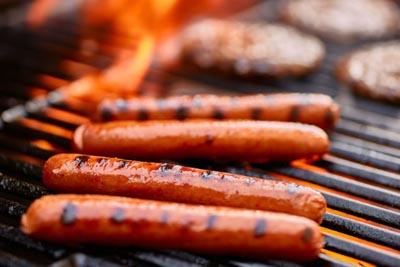
Before lighting the grill this Fourth of July weekend, the Virginia Department of Agriculture and Consumer Services encourages the public to practice food safety to keep the celebration free from illness-causing bacteria.
The CDC estimates that 48 million people get sick, with 128,000 hospitalized, each year from foodborne illness. Integrating key food safety steps into weekend cookout plans can provide everyone with a great and safe time this Fourth of July.
“Just because grilled meats appear cooked on the outside doesn’t mean they are completely done on the inside. Taking simple steps when preparing food, such as using a meat thermometer, helps ensure foods are safe to eat,” says Brad Copenhaver, VDACS Commissioner. “Enjoy celebrating our nation’s birthday this weekend by practicing food safety, especially when grilling, to protect your family and friends from food-borne illnesses.”
The first step of food safety is to stop the spread of bacteria around the kitchen. Before starting food preparation, make sure you wash your hands with soap and warm water for at least 20 seconds. Dry them with a clean towel or disposable paper towel. Wash hands immediately after handling meats and poultry to avoid cross-contamination of other foods, spice containers or preparation surfaces. The following are USDA food safety recommendations:
- When grilling and eating outdoors, ensure there is a source of clean water. If not, bring water for food preparation and cleaning or pack clean cloths and moist towelettes for cleaning surfaces and hands.
- Confirm cooked foods have reached a safe minimum internal temperature by using a food thermometer. Always plate cooked meats on a new plate or platter.
- Cook raw beef, pork, lamb and veal steaks, chops and roasts to 145 F. For safety and quality, allow meat to rest for at least three minutes before carving or consuming.
- Cook raw ground beef, pork, lamb and veal to 160 F.
- Cook egg dishes to 160 F.
- Cook fish to 145 F.
- Cook raw poultry, including ground poultry, to 165 F.
- Keep raw meats separate from other foods, like fruits and vegetables, to prevent cross-contamination.
- Fully pack coolers with ice or frozen gel packs to help to keep perishable foods cold. Pack beverages in one cooler and perishable food in another cooler.
- When taking perishable foods in the car, keep the cooler in the coolest part of the car. Once outside, place it in the shade or out of the sun whenever possible.
- Do not leave perishable food items outside for more than two hours if the temperature is at or below 90°F, and only one hour if the temperature is at or above 90⁰F.
- Refrigerate leftovers within two hours (one hour if temperatures are at or above 90⁰ F). If you are not sure how long food has been sitting out, throw it out immediately.
For more food safety information, visit the USDA Food Safety and Inspection Service at www.fsis.usda.gov, call the USDA Meat and Poultry Hotline at (1-888.MPHotline) Monday through Friday, from 10 a.m. to 6 p.m. ET, or send your question to Ask.USDA.gov.










